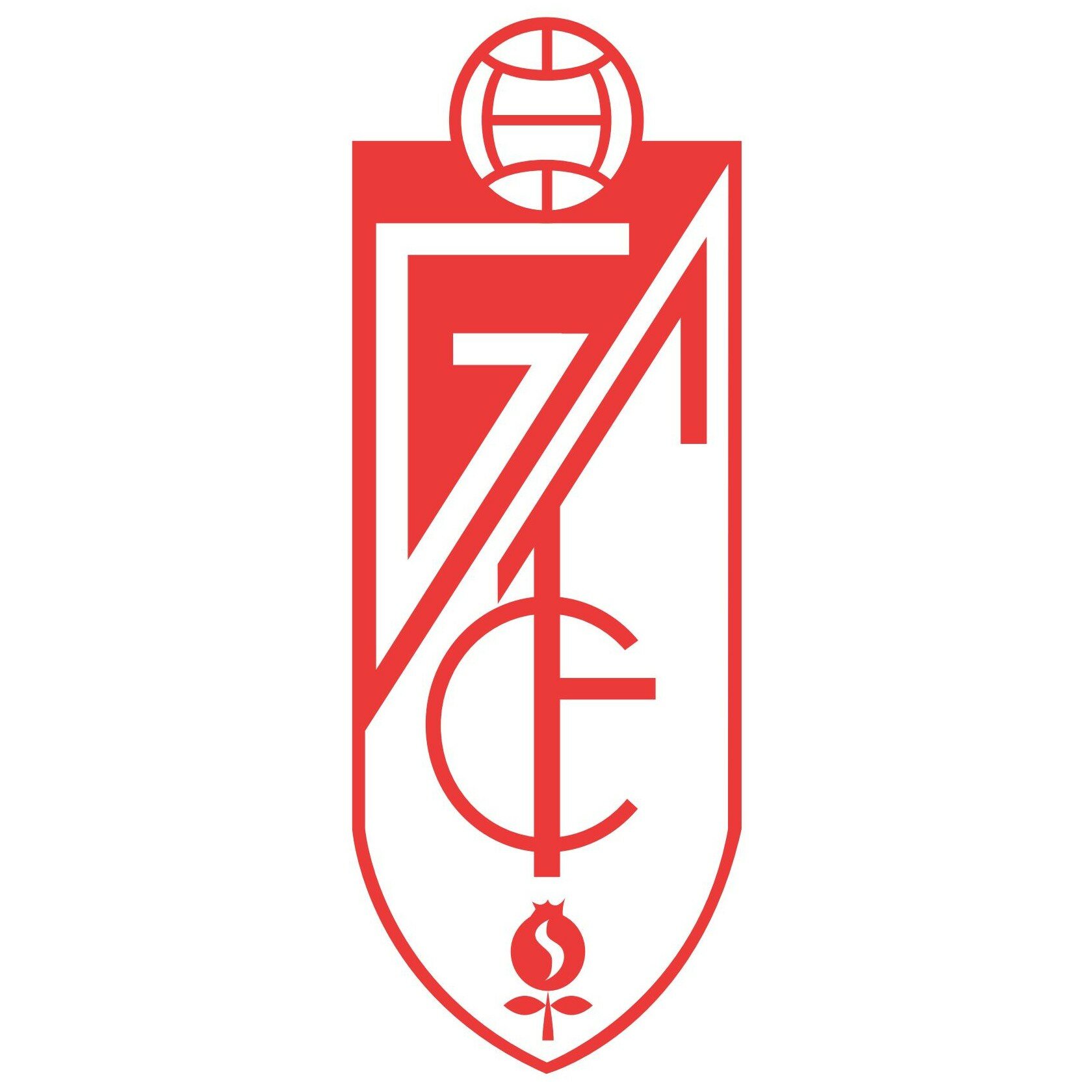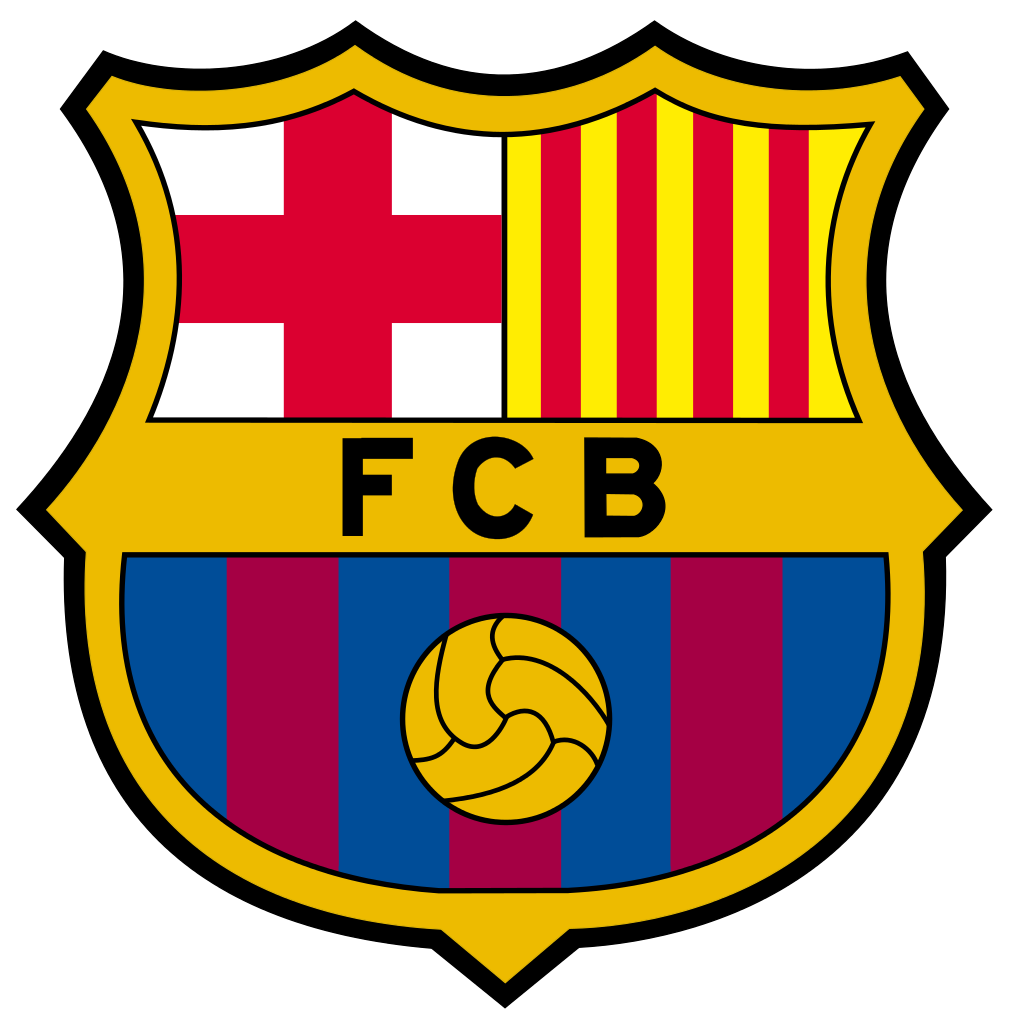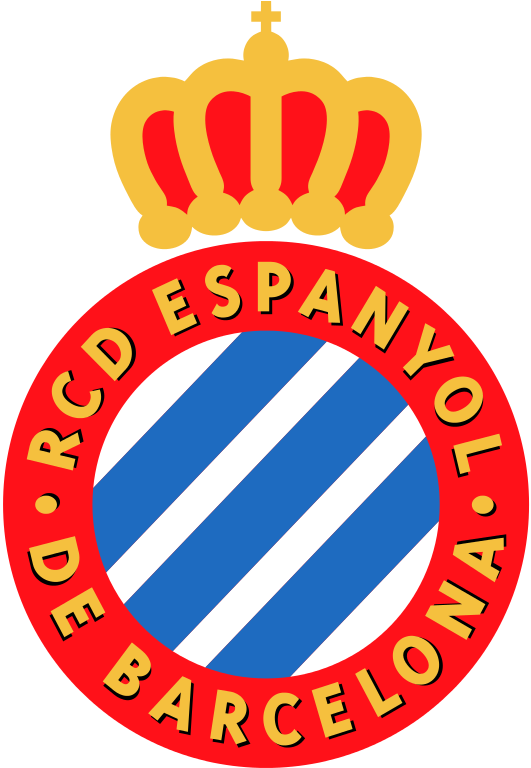club | 2015-05-08
The coaching staff that changed everything
Reinvigorating FC Barcelona
It’s the big story of the week: The Prodigal Son returned to the Camp Nou. Only that Guardiola wasn’t really the prodigal son and he returned not for good, but temporarily, as the rival’s coach. While most media outlets have devoted inches of space to the biggest sidestory in the Barcelona vs Bayern Munich match, hailing Pep Guardiola’s genius and deservedly so, they seem to have forgotten that Barcelona has a coach, too. And while he is not as known and loved as Pep – at least not yet, though the Camp Nou has chanted his name during the first-leg tie – all indications point to the possibility that he might be doing something right: The team is competing for a treble and the players are in the best possible form going into the most decisive part of the season.
Meet Luis Enrique, the man who has gone head-to-head with Pep Guardiola in the Champions League semifinal tie and, at least for now, has come out on top. And meet the team behind him – the men whose job on the tie was to neutralize the tactical genius of Pep Guardiola, and did – the FC Barcelona coaching staff.
Luis Enrique
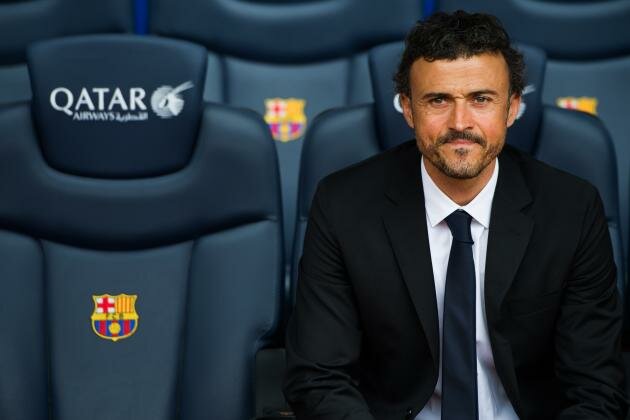
Picture: Bleacher Report
FC Barcelona’s decision to hire Luis Enrique – the last Barça captain before Carles Puyol retired last season – was an expected one. A former Barcelona utility player mainly in midfield and attack, Enrique earned his stripes as a manager when he replaced Josep Guardiola at Barça B in June 2008.
Enrique succeeded with a group of talented youngsters to win Barça B promotion to the Segunda División, finishing third in the 2010/11 season, the highest position Barça B has reached in its history. After terminating his contract with Barça B, Lucho signed with Roma in June 2011, an experience that wasn’t the most successful, but helped Lucho to cope with the pressure of being a first-team coach, and to experiment with his ideas. He was officially hired as a coach for RC Celta de Vigo in June 2013, helping the Galician team to finish eighth in what was a great experience for him and for Celta.
He signed as Barcelona manager last May 2014. The ink has yet to dry when questions about his capabilities began to surface. Was he good enough to manage one of the best football clubs in the world? What will Lucho, as he is called by those close to him, add from a tactical point of view? Can he deal with the pressure of being a Barça coach? All these are questions that made all culés wonder.
To some, these questions have so far been answered. Lucho, especially toward the end of this season, has shown that not only could he manage Barcelona, he can do it with flying blaugrana colors; breaking some records along the way and improving what were previously considered as the team’s vulnerabilities.
Lucho has shown what his Barça is: One that plays high-intensity football, pressing opponents, hitting them on the break once the opportunity of doing that arises. The team has so far scored 11 counterattacking goals. He has also strengthened the team defensively; Barcelona has only allowed 29 goals in 53 games and managed 30 clean sheets in all competitions so far this season, the third best in the club’s history and only three clean sheets away from breaking the club’s record registered in 2011/12, with six or possibly seven games left to play. Lucho has also fixed the team’s Achilles heel: dealing with set pieces both defensively and offensively.
He has not done everything by himself, though, and he has six men behind him, in charge of everything, from the physical to the psychological aspects of the game. They are: Juan Carlos Unzué (assistant manager), Roberto Moreno (second manager), Joan Barbarà (auxiliary coach), Rafa Pol (physical trainer), Joaquín Valdés (psychologist) and José Ramón de la Fuente (goalkeeper trainer). These names probably don’t sound familiar, but they are doing a great job, helping the team in many ways. Let’s give credit where it is due and recognize the efforts these men have put in. Let’s meet the men behind the curtain.
Juan Carlos Unzué - Assistant Manager
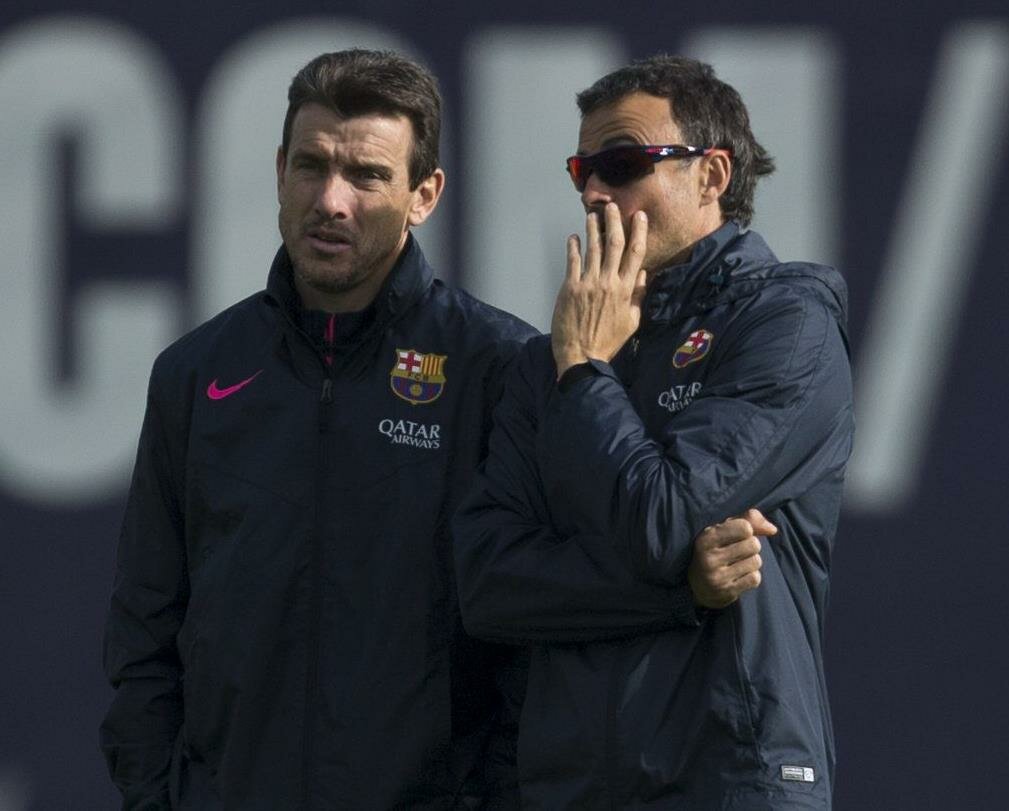
Unzué is a retired goalkeeper, starting his goalkeeping career at Osasuna in 1986. He then went to Barcelona and guarded the blaugrana posts for two years (1988-1990), and left for Sevilla where he made over 300 appearances. He also played for Tenerife and Oviedo, returning to Osasuna before retiring. Unzué was a complete goalkeeper with outstanding agility and reflexes.
Unzué’s first managerial experience was being the head coach of CD Numancia in the Spanish league second division where he finished the 2010/11 season in the 10th position.
His career-changing move happened later in 2013, when he was chosen by his close friend Luis Enrique to be a part of his team. Last season he was the assistant coach in Celta Vigo, alongside Lucho. When Enrique became a Barcelona coach, Unzué went with him.
Unzué is the key when it comes to strategic play with set pieces at both ends. Lucho himself has acknowledged in an interview that the improvement in set pieces was because of his assistant manager. Asked by a journalist, “Is Barça now scoring at set pieces because of tactics or luck?” Enrique replied, “Unzué is doing a great job.”
This is not only coming from Lucho’s mouth, but the stats also prove that what Unzué is doing is remarkable. This season, Barcelona has scored 19 goals from set pieces in all competitions, including Jeremy Mathieu’s winning goal away versus Celta and the opening goal in the last Clásico and has only conceded five goals from set pieces.
Roberto Moreno - Second Manager
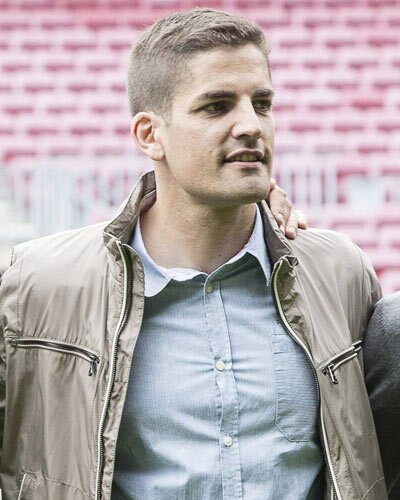
While Unzué has done his job exceptionally well, there is no chance we can give credit only to two men in the whole staff. The fitness coach plays a crucial part in every football team in the modern game and Barcelona is fortunate to have two of the best in that field, Rafa Pol and the other assistant coach, Robert Moreno.
First, let us introduce Roberto Moreno.
Roberto, or Robert, Moreno started coaching in 2003 with teams from Penya Blaugrana Collblanch. He moved to L'Hospitalet, Castelldefels, Damm and from there to FC Barcelona, where he was Luis Enrique’s assistant at Barça B.
Moreno and Enrique have a good history, and it's the the fourth time the assistant coach is managing under Lucho. He met Luis Enrique when they were training the Barça B team together and the manager recognized that Moreno had a lot of knowledge. They have had a very close friendship and been inseparable ever since.
The 37-year-old is considered one of the pioneers in Spain in modernizing rival scouting and video analysis. He is a specialized coach: his analysis is the basis for deciding the tactical plan for the next game and the selection of different players based on the requirements of each encounter. Those close to him say he is a stickler for details, watching games until he is sure that he hasn’t left any stone unturned.
He founded, together with Rafa Pol, the Futbol de Libro (FDL) website where coaches publish their knowledge about the game. He also has a 272-page-book, Mi “receta” del 4-4-2 : reflexión, desarrollo y aplicación de un modelo de este sistema (My “recipe” of 4-4-2: reflection, development and application of a model of this system). This is his first book, presenting his vision of the 4-4-2 playing system and how to develop other football systems. Moreno is also one of the founders of the MC Sports publishing house.
Those who know Moreno speak of him as a very thoughtful person, someone who strives to learn every day without closing any doors. Calm and talkative, he has an interest in fields like philosophy and psychology, discreetly avoiding the spotlight or give interviews.
Rafa Pol - Physical Trainer
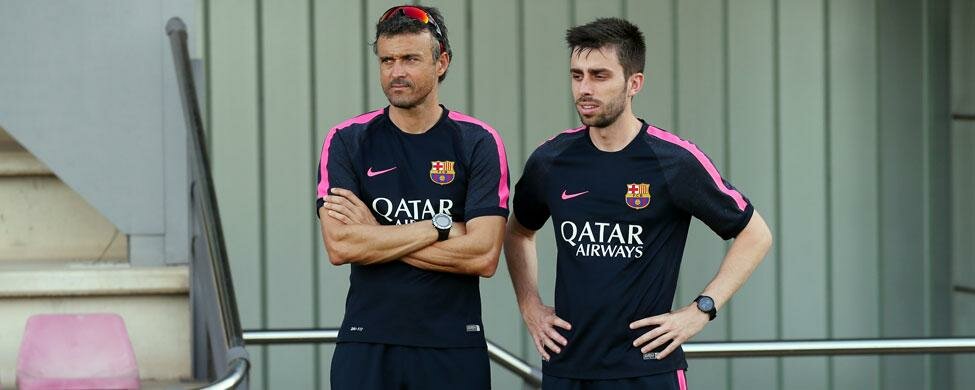
Picture: DiarioGol
Pol was the typical nerd when he was studying under Professor Francisco Seirul·lo in the Instituto Nacional de Educación Física (National Institute of Physical Education or INEF), Seirul·lo himself was the fitness coach in the Guardiola days, Pol followed in his professor’s footsteps and worked in the same field. Seirul·lo saw Pol’s qualities and what made him a different student.
Rafel Pol started working at Levante Las Planas. He started with Luis Enrique in Roma only at the age of 24. Going to Celta with Lucho and now Barça.
Rafa Pol possesses an impressive CV, the 27-year-old man has a a degree in Sciences of Physical Activity Sport from INEF and a master’s degree in Prevention and Rehabilitation of sports injuries in football from the University of Castilla La Mancha.
Moreno isn’t the only author among the coaches, Rafa has also written a book, and coincidentally is the reason why Moreno and Pol met. In 2011, Pol sent a book called La preparación ¿física? en el fútbol (The physical preparation in football) to Moreno’s MC Sports publishing house. From that point on, the two of them created Futbol de Libro.
One of the major aspects every fitness coach needs to be very wary about, especially in big clubs, is the recovery session. Recovery sessions are the trainings players have a day following a match day. These are crucial, because in a club like Barça, where there’s a game almost every three days for a period of eight to nine months, players need to recuperate physically and be in the right condition to be able to actually play each 90 minutes with pace and intensity.
Rafa cares, as the most successful of fitness coaches do, about the intensity of the training sessions. Intensity has always been one of the most important factors in the game, especially in the last three years, with the sudden rise of the pressing and counterpressing football. Rafa knows that, and has said, “Los entrenamientos deben ser como partidos, sino los partidos se vuelven entrenamientos (The trainings need to be like the games, otherwise the games will turn into trainings).”
Pol’s philosophy is summarized in the saying: “The best way to train is to play football and not do isolated physical training,” which is based on the basic principles taught by Seirul.lo: “Preparing a game by doing something that doesn’t happen in a game is ridiculous.”
It is worth noting that Barcelona has had fewer injuries this season, and all players are available for selection going into the most crucial stretch of the season, something that many older fans claim to have never seen before. This is not mere coincidence, and Lucho’s earlier rotations and the contributions of the physical trainers has been an important factor to help the Blaugrana reach the final stages in the best possible form for the team.
Joan Barbará - Auxiliary Coach
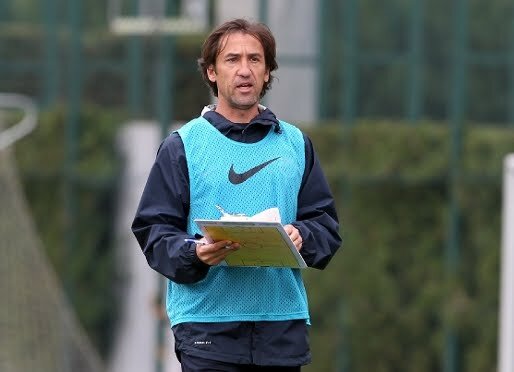
Picture: Sport
Joan Barbará Mata is a retired Spanish forward, and nowadays acts as the auxiliary coach of FC Barcelona. As a professional player, Joan played in the lower Spanish leagues, like the Segunda División and the Segunda División B. At Sabadell he played for eight years with over 200 appearances, later on at Salamanca playing for seven years and over 180 appearances.
His first coaching job was in 2008 as an assistant at Barcelona B, where stayed through Eusebio Sacristán's reign. In 2014, he left the Mini Estadi for the Camp Nou as an auxiliary coach. His job is to help the other coaches in the best possible way, both in trainings and in the games. Barbará knows Luis Enrique since their times at Barça B and his insights in the observation of the rival’s weak and strong spots is highly regarded.
One of the things that have been particularly interesting during the season is the use of technology to change different tactical aspects during a game. Unzué frequently uses a headset during games to receive suggestions. On the other end of the line, high up in the stands, Moreno and Barbará are observing the game, noting the opponent's’ changes and where space is created. After Unzué discusses these notes with Luis Enrique they can decide to take the appropriate measures.
Joaquín Valdés - Psychologist
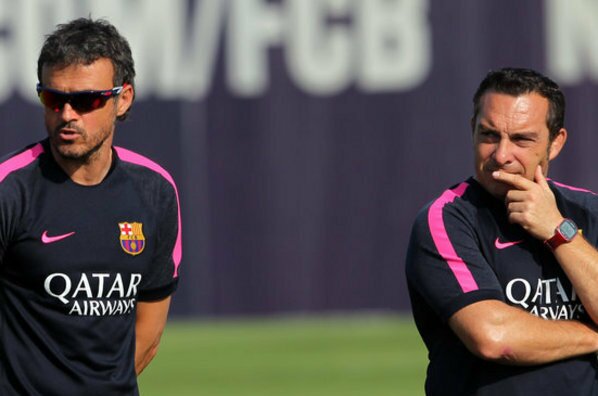
Picture: Mundo Deportivo
Joaquín Valdés is the Barcelona psychologist, and much like Moreno, he has been with Lucho for a long time. The former judoka has been with Lucho since the Barça B days between 2008-2011, when Lucho managed to make the B-Team into a fighting force, finishing high up in the Segunda.
In 2005, before he started working with Lucho, Joaquin founded the global company called Formasport, with psychologists specializing in sports like himself. In 2012 and 2013, he opened two sports websites that offer online sports counselling service: futboldecabeza.com and deportedecabeca.com.
His role is to ensure that there are no bad feelings or destructive negativity surrounding the players, to ensure a positive atmosphere around the training grounds, to sharpen the players' minds and that Lucho engages with the team in the best way. This is crucial for team success, and we can see that the team became much more well-connected in the second half of the season. This has to do a lot with the psychological mindset. It's clear that he’s doing a fantastic job, you can clearly see that the team has energy and positivity in the trainings and matches.
Our MSN trio, for example, are very close. You can see in both the trainings and the games that they interact like good friends, often joking around and having a good time, actually enjoying the time they spend together working, which is amazing considering that they are three of world football’s biggest superstars. This connection helps the team as the front three feel safe with each other and build trust on each other and their their teammates, contributing even more on the performances.
Joaquín leaves nothing to chance. He studies Luis Enrique’s press conferences and how the coach communicates with his players from the side of the pitch and how these interactions influence their mood.
José Ramón De la Fuente - Goalkeeper Trainer

Picture: ilcatenaccio.es
José Ramón with Barcelona-star Messi.
What makes José Ramón De la Fuente different is not the way he runs the goalkeepers’ training sessions, but the way he advises them and assists to make the right decisions during matches. “A goalkeeper must have character and personality,” says the Catalan.
De la Fuente’s role is crucial, because a confident goalkeeper means an extra boost of confidence for his defenders, especially for a team like Barça that plays with a high line. Stats confirm that De la Fuente is doing an impeccable job with both Claudio Bravo and ter Stegen, keeping 30 clean sheets between in all three competitions this season.
These are the men behind FC Barcelona’s, some say, rebirth this 2014/15 campaign. Judging from the team’s progress thus far – top of the league, Champions League semifinalist, and Copa del Rey finalist, with an answer to previous attacking weaknesses and defensive threats, and with all 23 players fit in the most important stretch of the season, these men have done an exemplary job in reinvigorating the team.
Anything wrong? Send your correction.



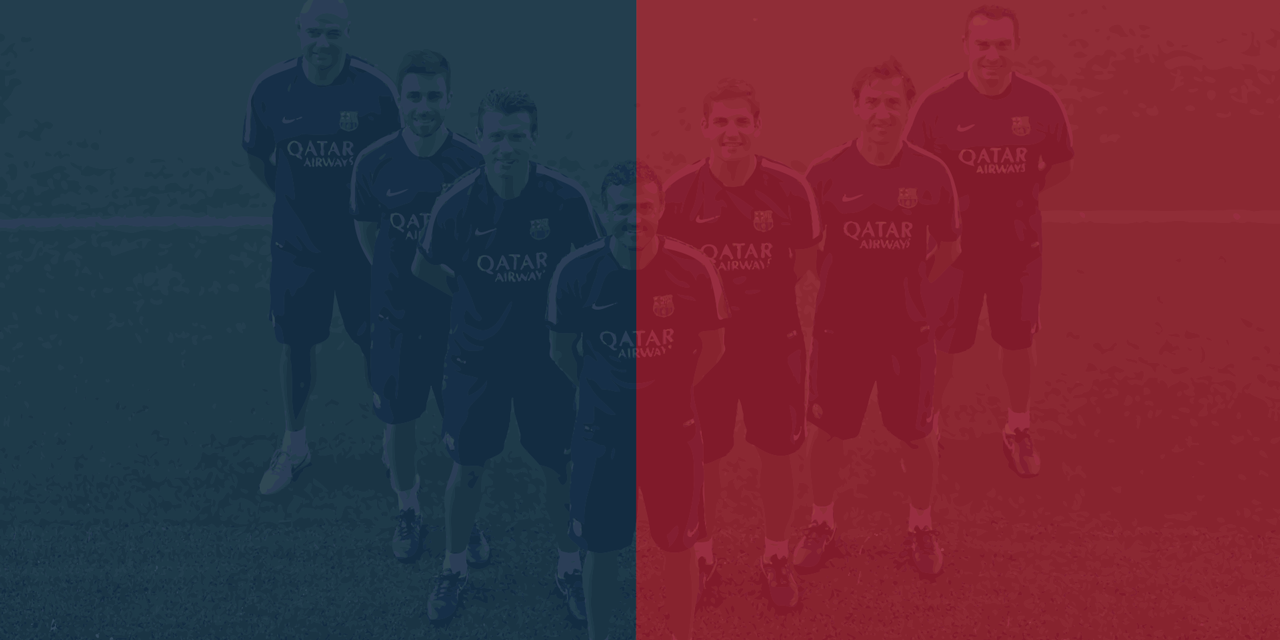



 Barcelona News 24/7
Barcelona News 24/7
